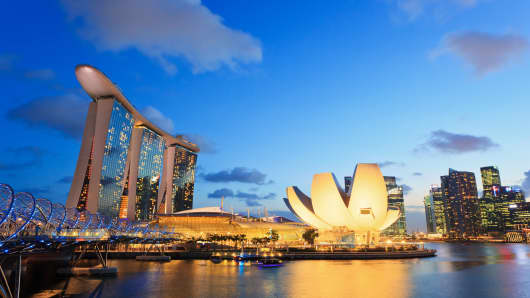The Singapore stock market has been on a tear recently, trading at highs not seen since late 2007, however, the rally could be short-lived as analysts warn overhanging risks threaten the Southeast Asian city's future economic growth.
Over the past week, the Straits Times Index has climbed 3.7 percent to 3,400 on Thursday, highs not seen since late 2007.
Analysts say the rally on Singapore's main index, which is heavily weighted in financials, has been driven by better-than-expected earnings results mainly from the banks, but concerns over the future economic picture are likely to put a dampener on the rally.
"Strong earnings have driven the [week's] rally on the index, which has so far this year been weighed down by weakness in its main sectors, such as banks, property and agricultural stocks," said Pearlyn Wong investment analyst at Julius Bear, which currently has a neutral to underweight position on Singapore stocks.
(Read More:
As Singapore's Casinos Slow, Will the Economy Suffer?
)
On Thursday Singapore bank DBS posted better-than-expected quarterly profits of S$950 million ($770 million) up 2 percent from a year earlier. Shopping mall developer CapitaMalls Asia reported strong earnings last week as well, with net profits jumping 9.6 percent in the first quarter on a year earlier.
"We would not label Singapore a screaming buy," Wong said. "The economic picture is weak and there is a lot of policy risk in terms of further tightening measures on the property market from Singapore," she added, referring to the seven rounds of property cooling measures seen over the past four years.
According to Seng Wun Song, an economist at CIMB Research, despite the recent run of better than expected earnings, there are still a lot of headwinds for Singapore.
"The Singapore economy faces a lot of risks. Property developers are under pressure from increased government measures, banks have been squeezed by weak gross domestic product [GDP] growth and an oil price which is heading down and lagging orders for shipyards has weighed on the index's conglomerates," he added.
The Singapore economy contracted 1.4 percent in the first quarter from the final quarter of last year and the country's central bank the Monetary Authority of Singapore (MAS) said in its semi-annual economic review on Tuesday that recovery going forwarded could be choppy given the outlook for the global economy.
(Read More:
Singapore Faces Choppy Recovery: Central Bank
)
Furthermore, inflation is still a difficult issue for Singapore, as a surge in rent and car prices have kept inflation high at around 4 percent over the past two years. Meanwhile, the unemployment rate rose to 1.9 percent in the first quarter of 2013, up from 1.8 percent in the previous quarter.
As an export-dependent economy, Singapore is highly susceptible to swings in global investor sentiment. More recently the picture has been mixed as weak economic data coming out of the U.S. and China has raised concerns, while the formation of a government in Italy and positive developments in Japan's economy has alleviated some fears of weaker global growth.
"Less gloomy global macro news is good news for export-dependent Asian economies like Singapore," said Song. But the index, despite the recent surge is one of the laggards this year behind China and Korea, up 1.7 percent year to date.
(Read More:
After the Dire Data, Singapore Risks Another Contraction
)
Heavy dominance of financial, property and agricultural stocks in the index, which have all posted lackluster performance up until recently, is the reason for the less than impressive performance of the Straits Times Index, said analysts.



